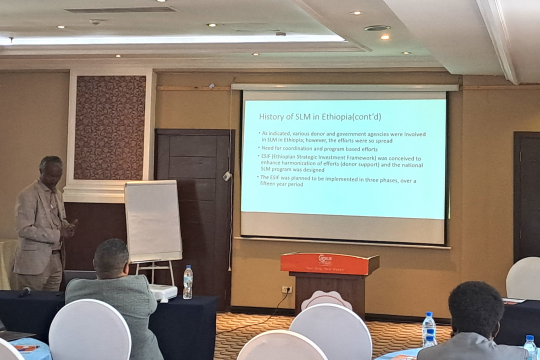How can a Just Low Carbon Transition in Sustainable Land Use be achieved? This was the topic at a workshop in Addis Ababa on December 13, 2024. It brought together experts from various government institutions, civil society organizations, non-governmental organizations, and researchers.
Dr. Abebe Beyene, Director of EfD Ethiopia and the Environment and Climate Research Center (ECRC) explained that the workshop's objective was to identify sectors to prioritize and propose issues for transformation initiatives in 2025. He underlined the challenges in sustainable land use management and how there is a collective responsibility to drive a just low-carbon transition in the country. Abebe Beyene also stressed the necessity of holistic approaches and robust partnerships across sectors to address those challenges.
Aimed at identifying prioritized sectors
The workshop was part of the Inclusive Green Economy (IGE) in Practice program, a capacity development program aimed at senior civil servants and policymakers. Researcher Asaye Ketema explained how the program supports Ethiopia, Kenya, Rwanda, Tanzania, and Uganda in transitioning to an inclusive green economy through research-policy interactions and evidence-based policymaking. One important aim of the workshop was to identify relevant so-called transformation initiatives, that is, specific initiatives that the IGE Fellows will focus on during their participation in the program.
Asaye Ketema detailed how the program builds capacity, fosters organizational change, and nurtures collaborations between government bodies, academia, and stakeholders to establish a robust national system for an inclusive green economy.
Connected to climate change adaptation and mitigation
EfD Researcher Dr. Zenebe G. underscored the critical role of sustainable land management (SLM) in combating climate change in Ethiopia. He delved into the historical backdrop of SLM efforts in the country, dating back to the 1970s. Zenebe G. highlighted the pivotal role of land in the climate system and the potential benefits of managing land resources sustainably to address climate change. He also explained the connection between SLM and climate change adaptation and mitigation.
Agriculture and agroforestry in focus
During the workshop discussions, participants used various criteria to select sectors for 2025, including contribution to greenhouse gas emissions, impact scope at different levels, poverty reduction and inclusiveness contribution, and the enabling environment for activity implementation, such as policy availability in the country. As a result, agriculture (crops and livestock), forestry/agroforestry/mixed agriculture, and rangeland management were prioritized for 2025 transformation initiatives.
Will align with other countries in the region
Abebe Beyene explained that the selected priority sectors will be further aligned at the regional level to harmonize strategies and approaches across the countries participating in the IGE program. Through this regional alignment, the implementing countries can leverage collective expertise and share knowledge to advance the goals of a just low-carbon transition in sustainable land use across the region.
